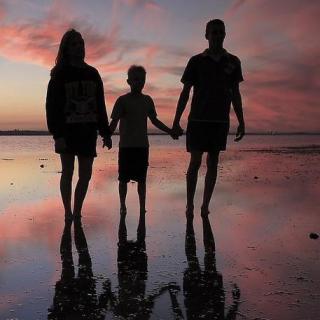
介绍:
想成为我们的主播,欢迎加微信 xdfbook 投稿。
一段美文,一首英文歌,或是一点生活感想,全由你做主。
《有一种痛,叫独生子女的痛》
The Lifelong Pain of Being an Only Child
My mother is one of eight siblings and she tells me sometimes that I should be grateful for being an only child. Usually, when she says this, it’s because of the latest eye-rolling family drama . But to say this is to misunderstand me so profoundly it makes me want to cry.
I have my guesses as to why I never had a sibling, though my mother and I have never discussed it. It could be that it wasn’t a choice for her, as it isn’t for many others: emotionally, medically, financially, for any number of reasons, sometimes it just isn’t possible to have more than one child. But if you can, I believe that giving your son or daughter a sibling is one of the most loving things you can do for them.
Don’t get me wrong; growing up as an only child wasn’t all bad. My books were never torn by a sticky-fingered toddler. When my father passed away more recently, I inherited a significant sum that I had to share with nobody except the taxman. But I would have traded all of this in an instant—would still trade it now—for having grown up with a sibling.
For not having had to roam on the beach during our yearly visits to the South of France until I found a girl roughly my age of whom I could beg, “Want to play with me?”
For not having had to set up Monopoly games1) and then play two people’s turns myself.
For sharing the burden of expectation with someone, so that my mother could say, “Well, I don’t know exactly what Claire thinks she is doing with this writing thing, but David, David’s a doctor. Stephanie has been promoted to head of her department.”
For sharing, too, the burden of care, as I think about my aging mother and stepfather across an ocean.
For having learned to better take teasing, to exchange apologies, to accept conflict as an inevitable part of life, and learn strategies for dealing with it. “Say sorry to each other,” my friend’s parents told her and me one summer after one of us had pushed the other down the slide and a fight had ensued.
“Say sorry to God. Now say I love you. Now hug each other.” It struck me later that they must have been used to—even sick of—saying this to her and her sister. For me it was a single teachable moment that stands out in my childhood for its novelty, for its uniqueness.
Writing pages and pages in my journal after we moved from Belgium to England, I would imagine myself instead lying on my side, elbow propping me up, whispering to my sister. “Can you believe these people?” I would say to her after a rough day at my new school.
“Can you believe they think Belgium is a part of Germany?”
It’s easy, of course, to idealize nonexistent siblings. I could just as easily have had a brother who beat me up or a sister who ignored me, a sibling of either gender who outshone me or who needed my parents more than I did. But even if I had—even if I’d been just as lonely or had different emotional issues to deal with as a child—I believe that growing up with siblings teaches children lessons that I never learned, that I would be infinitely better off for having internalized2 ) early .
I can’t read except in total silence. I can’t share things—books especially—without my whole self-cringing3). And people? Forget about sharing people. Embarrassingly, I still ache for best friends, for people who belong exclusively to me. My heart still pangs when someone I’m close to seems to care a little too much about someone else, because I didn’t learn in childhood that a person can love someone besides me, without it diminishing their love for me.
My mother believed in doing things herself. The washing, the ironing. The cooking, the baking. She believed in giving me the space4), instead, to practice my flute and do my homework. That’s a laudable instinct—but in the long-term, it has not served me well. My practical skills are nonexistent, shockingly so. If she’d had more than one child, would she have caved to the pressure of the sheer amount of work? Made us take on some of it? Taught us how to look after ourselves better?
I’ll never know, just as I’ll never know what happened to the girls I met in the South of France, the girls with whom I built sandcastles and swam in the sea and exchanged letters between summers, the girls whom I imagined to be something like sisters, and yet, in the end, faded from my life, as people with whom we do not share blood are wont5) to do.
我的母亲有七个兄弟姐妹。她有时会跟我说我应该心存感激,庆幸自己是独生子女。通常,她这么说是因为最近让人侧目的戏剧性家事。但她这样说真是太不理解我了,让我想哭。
虽然从来没有和母亲讨论过为什么我没有兄弟姐妹这个问题,但我有自己的猜测。或许她是身不由己,正如很多人一样:任何原因有时都会导致不太可能多生孩子,不论是情感上的、身体上的、还是经济上的。但是,如果条件允许的话,给你的儿子或女儿一个弟弟或妹妹,我相信这是你可以对他们做的最有爱的一件事。
不要误解我;作为独生子女长大也并非一无是处。我的书永远不会被手指黏糊糊、蹒跚学步的孩子撕坏。我父亲刚去世不久,我继承了一大笔财产,除了税务部门,没人跟我分这笔财产。但我当时——现在也是——宁愿即刻用这笔钱来换和弟弟或妹妹一起成长的体验。
这样我每年去法国南部游玩时,就不用在海滩上独自徘徊,直到发现一个和我年纪相仿的女孩,乞求她:“可以和我玩吗?”
这样我就不用摆好大富翁棋牌后,一个人假扮两个人轮流来玩。
这样就可以有人分担我所肩负的期望。妈妈就会说:“好吧,我不是很清楚克莱尔对写作是怎么想的。但是我很清楚大卫,他是个医生。斯蒂芬妮已经提升为部门领导了。”
这样也就可以有人和我分担赡养的负担,我是在念及大洋彼岸逐渐年老的母亲和继父时想到这一点的。
这样我可以学会更好应对别人的取笑,学会相互道歉,学会接受矛盾,把矛盾作为生活中不可避免的一部分,并学习处理矛盾的策略。“互相说对不起。现在对上帝说对不起。现在说我爱你。现在拥抱对方。”那个夏天,当我和朋友不知谁把对方推下了滑梯,然后大打了一架后,她的父母这样要求我们。后来我突然意识到,朋友的父母肯定已经习惯甚至厌烦跟她和她的妹妹说这些了。但是对我来说,这曾是我唯一受教的时刻,是我童年里闪耀的一刻,因为它是新奇的,它是唯一的。
从比利时搬到英国后,我一页一页地写日志时会幻想自己侧躺着,用胳膊肘撑起上身,和妹妹说着悄悄话。“你知道这些人吗?他们竟然认为比利时是德国的一部分,你能相信吗?”在新学校度过辛苦的一天后,我会这样跟她聊天。
当然,很容易把根本不存在的兄弟姐妹理想化。我很可能只是有个会痛打我的哥哥或一个无视我的姐姐,一个更优秀或是更需要父母关注的兄弟或姐妹。但即使我有这样的兄弟姐妹,即使我会一样得孤独或年幼时面临不同的情感问题,我仍然相信和兄弟姐妹们一起成长会教会孩子那些我从未学到过的道理,我相信早年将这些道理内化为我意识的一部分肯定会让我过得更好。
如果不是在完全安静的环境下,我就无法读书。我无法心甘情愿地和别人分享东西,尤其是书。那么人呢?别提分享人了。让我尴尬的是,我仍旧渴望最好的朋友,渴望专属于我的人。我亲密的人只要对除我之外的人稍微多一点点关心,我就会感到心痛,因为我在童年时光里没有学习到,除了我之外,他们也可以爱其他人,同时不减少对我的爱。
我母亲信奉万事自己动手,不论是洗衣服、熨衣服还是烹饪、烘培。但她不让我自己动手做事,而是相信应该给我时间,让我练长笛、做作业。这是种值得赞美的本能——但从长远来看,这对我并无益处。我的动手能力弱到惊人的程度。如果她有不只一个孩子,她会不会屈服于过多的家务压力?会不会让我们分担一些?会不会教我们如何更好地照顾自己?
我永远都不会知道答案,正如我永远不会知道我在法国南部遇到的那些女孩后来怎样了,那些和我一起堆沙子城堡、一起畅游大海、暑假结束后相互通信的女孩。我曾把她们想象成像姐妹一样的存在,但最终她们还是淡出了我的生活,就像那些和我们没有血缘关系的人一样,往往成为过客。
文章摘自:《新东方英语》杂志2017年7月号

